Analysis of Mental Health Nursing in Patient Care and Recovery
VerifiedAdded on 2022/12/07
|11
|3696
|398
Report
AI Summary
This report provides a comprehensive analysis of mental health nursing, focusing on the context of care, treatment aspects, and the crucial role of nurses in patient support and recovery. It begins with an introduction to mental health nursing, emphasizing the importance of nurses in improving patients' mental, emotional, and physical conditions, especially in cases of depression and other mental disorders. The main body delves into the analysis of depression treatment, including the symptoms and the treatments available such as antidepressants, cognitive therapy, and interpersonal psychotherapy. It also examines the principles of mental health treatment according to the Australian government's guidelines, highlighting patient rights, decision-making, and the importance of holistic approaches. Furthermore, the report details the role of mental health nurses in engaging patients, building therapeutic relationships, and supporting patients and their families. The report uses a case study of a patient with depression to illustrate the application of these principles and treatments, making it a valuable resource for understanding mental health nursing practices.
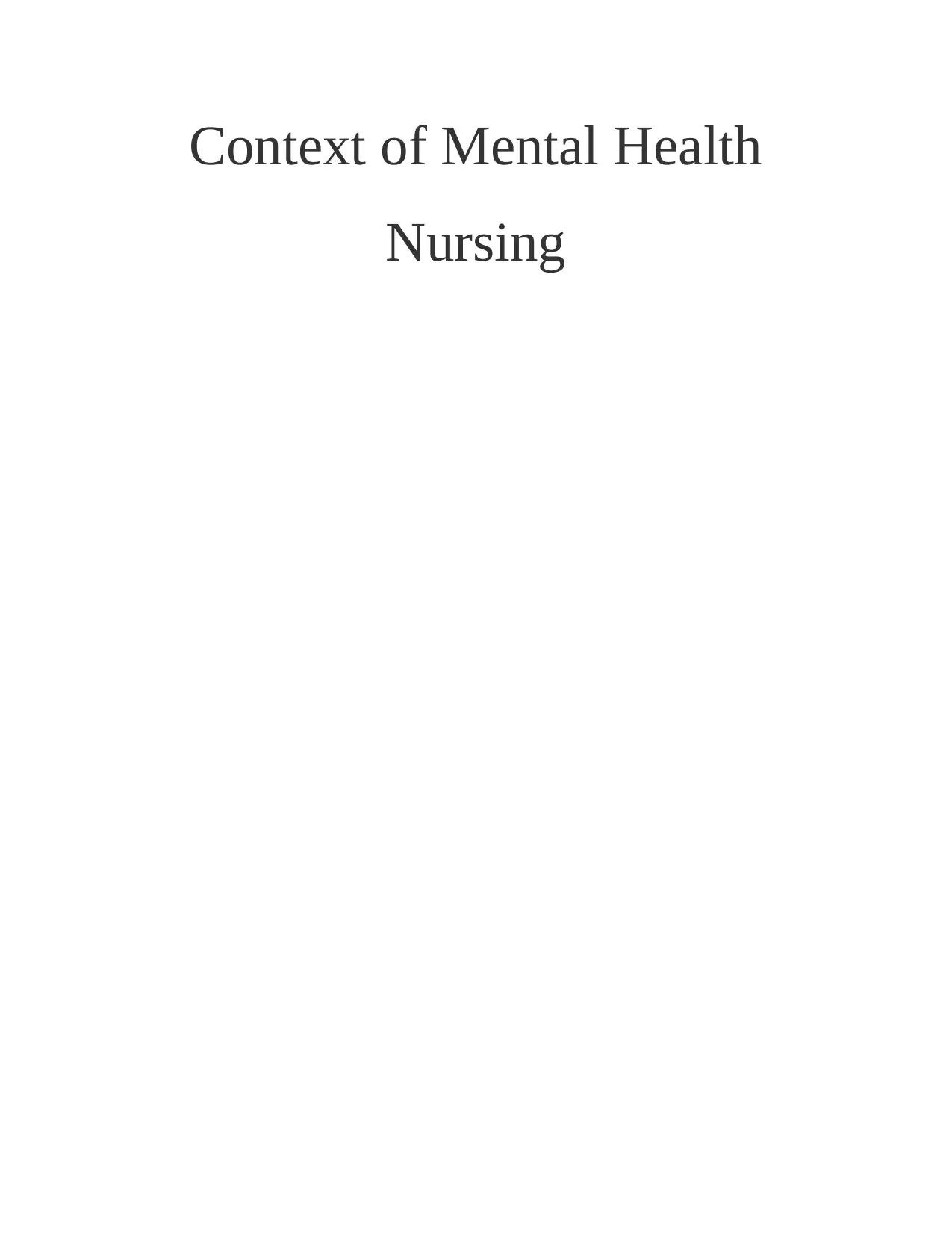
Context of Mental Health
Nursing
Nursing
Paraphrase This Document
Need a fresh take? Get an instant paraphrase of this document with our AI Paraphraser
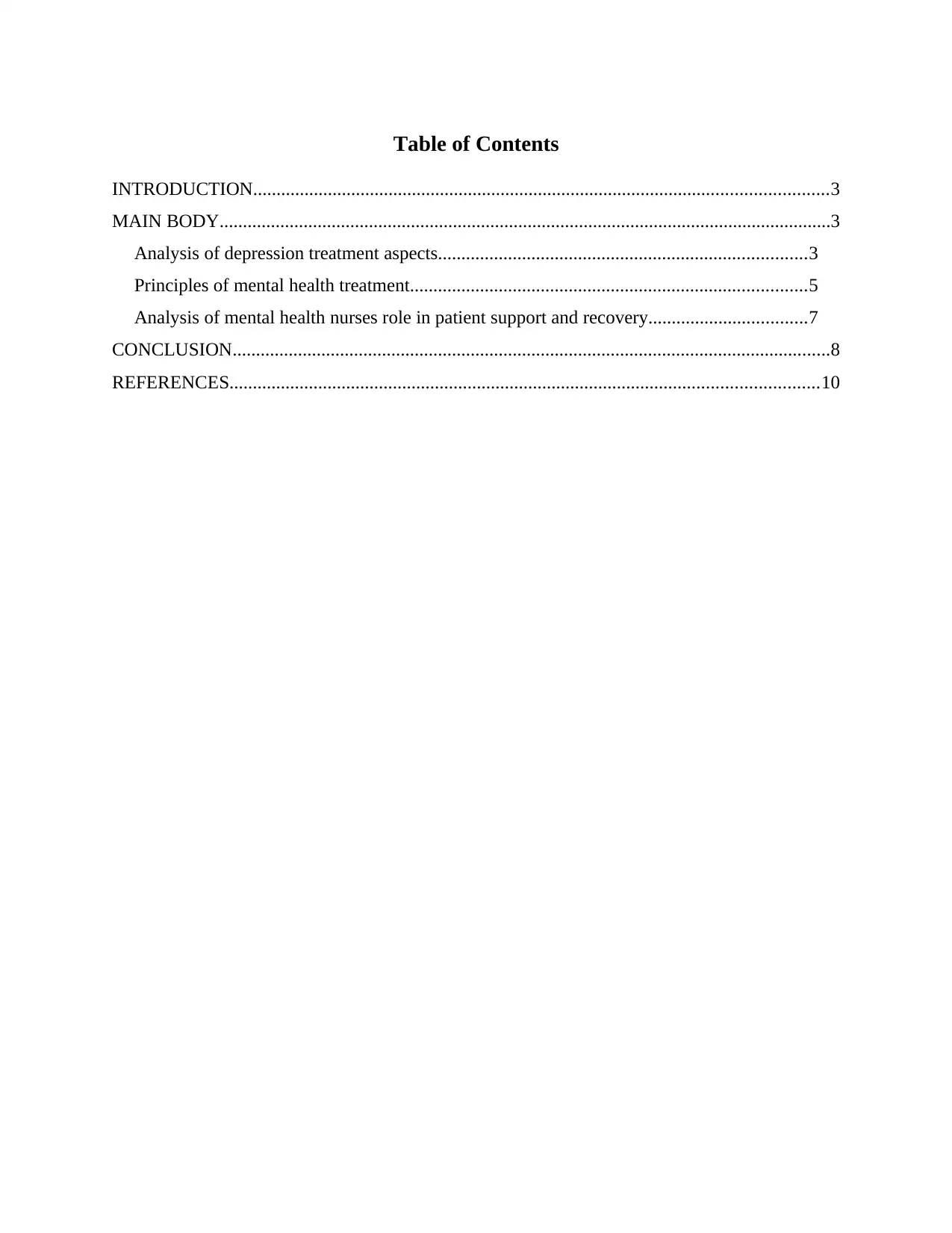
Table of Contents
INTRODUCTION...........................................................................................................................3
MAIN BODY...................................................................................................................................3
Analysis of depression treatment aspects...............................................................................3
Principles of mental health treatment.....................................................................................5
Analysis of mental health nurses role in patient support and recovery..................................7
CONCLUSION................................................................................................................................8
REFERENCES..............................................................................................................................10
INTRODUCTION...........................................................................................................................3
MAIN BODY...................................................................................................................................3
Analysis of depression treatment aspects...............................................................................3
Principles of mental health treatment.....................................................................................5
Analysis of mental health nurses role in patient support and recovery..................................7
CONCLUSION................................................................................................................................8
REFERENCES..............................................................................................................................10
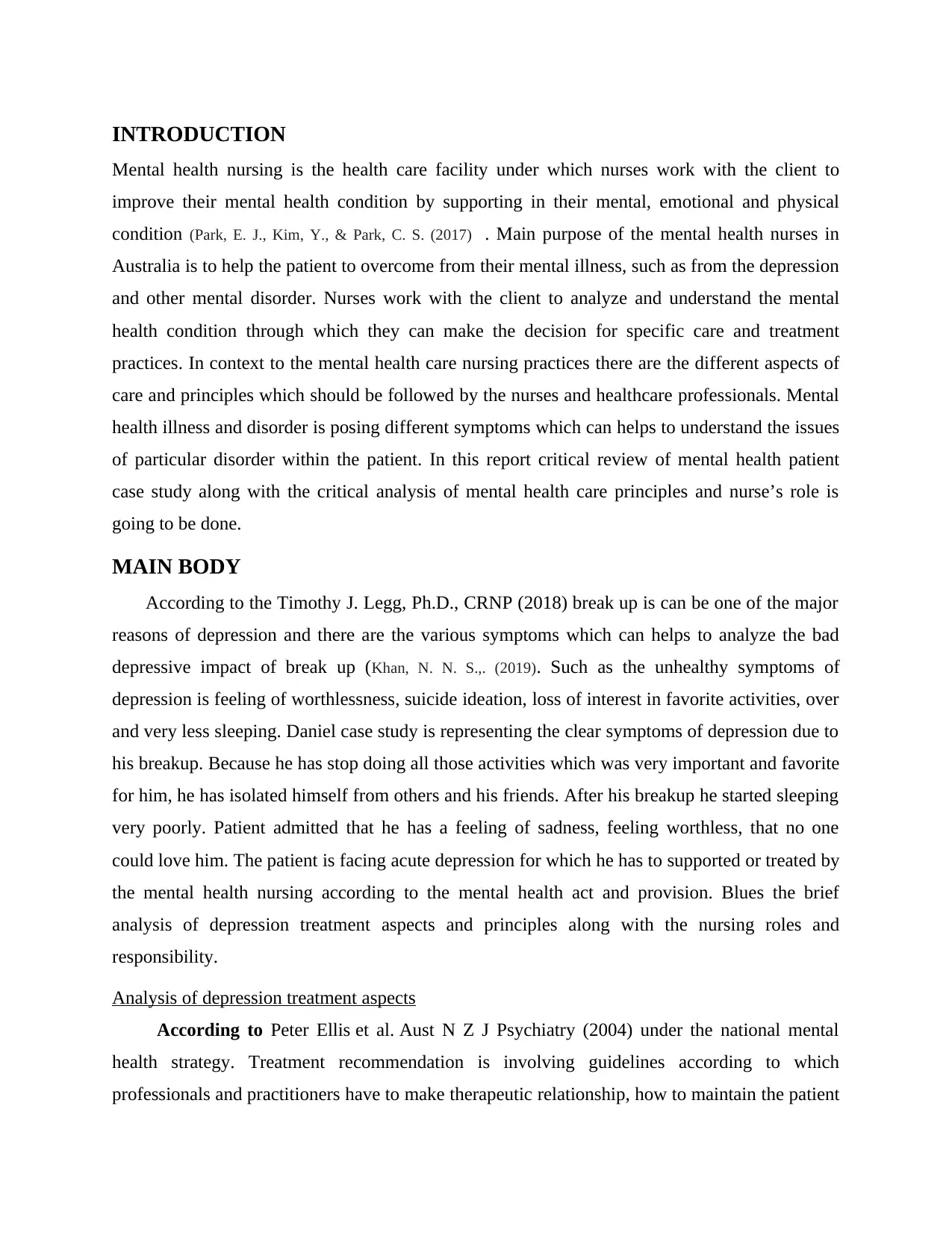
INTRODUCTION
Mental health nursing is the health care facility under which nurses work with the client to
improve their mental health condition by supporting in their mental, emotional and physical
condition (Park, E. J., Kim, Y., & Park, C. S. (2017) . Main purpose of the mental health nurses in
Australia is to help the patient to overcome from their mental illness, such as from the depression
and other mental disorder. Nurses work with the client to analyze and understand the mental
health condition through which they can make the decision for specific care and treatment
practices. In context to the mental health care nursing practices there are the different aspects of
care and principles which should be followed by the nurses and healthcare professionals. Mental
health illness and disorder is posing different symptoms which can helps to understand the issues
of particular disorder within the patient. In this report critical review of mental health patient
case study along with the critical analysis of mental health care principles and nurse’s role is
going to be done.
MAIN BODY
According to the Timothy J. Legg, Ph.D., CRNP (2018) break up is can be one of the major
reasons of depression and there are the various symptoms which can helps to analyze the bad
depressive impact of break up (Khan, N. N. S.,. (2019). Such as the unhealthy symptoms of
depression is feeling of worthlessness, suicide ideation, loss of interest in favorite activities, over
and very less sleeping. Daniel case study is representing the clear symptoms of depression due to
his breakup. Because he has stop doing all those activities which was very important and favorite
for him, he has isolated himself from others and his friends. After his breakup he started sleeping
very poorly. Patient admitted that he has a feeling of sadness, feeling worthless, that no one
could love him. The patient is facing acute depression for which he has to supported or treated by
the mental health nursing according to the mental health act and provision. Blues the brief
analysis of depression treatment aspects and principles along with the nursing roles and
responsibility.
Analysis of depression treatment aspects
According to Peter Ellis et al. Aust N Z J Psychiatry (2004) under the national mental
health strategy. Treatment recommendation is involving guidelines according to which
professionals and practitioners have to make therapeutic relationship, how to maintain the patient
Mental health nursing is the health care facility under which nurses work with the client to
improve their mental health condition by supporting in their mental, emotional and physical
condition (Park, E. J., Kim, Y., & Park, C. S. (2017) . Main purpose of the mental health nurses in
Australia is to help the patient to overcome from their mental illness, such as from the depression
and other mental disorder. Nurses work with the client to analyze and understand the mental
health condition through which they can make the decision for specific care and treatment
practices. In context to the mental health care nursing practices there are the different aspects of
care and principles which should be followed by the nurses and healthcare professionals. Mental
health illness and disorder is posing different symptoms which can helps to understand the issues
of particular disorder within the patient. In this report critical review of mental health patient
case study along with the critical analysis of mental health care principles and nurse’s role is
going to be done.
MAIN BODY
According to the Timothy J. Legg, Ph.D., CRNP (2018) break up is can be one of the major
reasons of depression and there are the various symptoms which can helps to analyze the bad
depressive impact of break up (Khan, N. N. S.,. (2019). Such as the unhealthy symptoms of
depression is feeling of worthlessness, suicide ideation, loss of interest in favorite activities, over
and very less sleeping. Daniel case study is representing the clear symptoms of depression due to
his breakup. Because he has stop doing all those activities which was very important and favorite
for him, he has isolated himself from others and his friends. After his breakup he started sleeping
very poorly. Patient admitted that he has a feeling of sadness, feeling worthless, that no one
could love him. The patient is facing acute depression for which he has to supported or treated by
the mental health nursing according to the mental health act and provision. Blues the brief
analysis of depression treatment aspects and principles along with the nursing roles and
responsibility.
Analysis of depression treatment aspects
According to Peter Ellis et al. Aust N Z J Psychiatry (2004) under the national mental
health strategy. Treatment recommendation is involving guidelines according to which
professionals and practitioners have to make therapeutic relationship, how to maintain the patient
⊘ This is a preview!⊘
Do you want full access?
Subscribe today to unlock all pages.

Trusted by 1+ million students worldwide
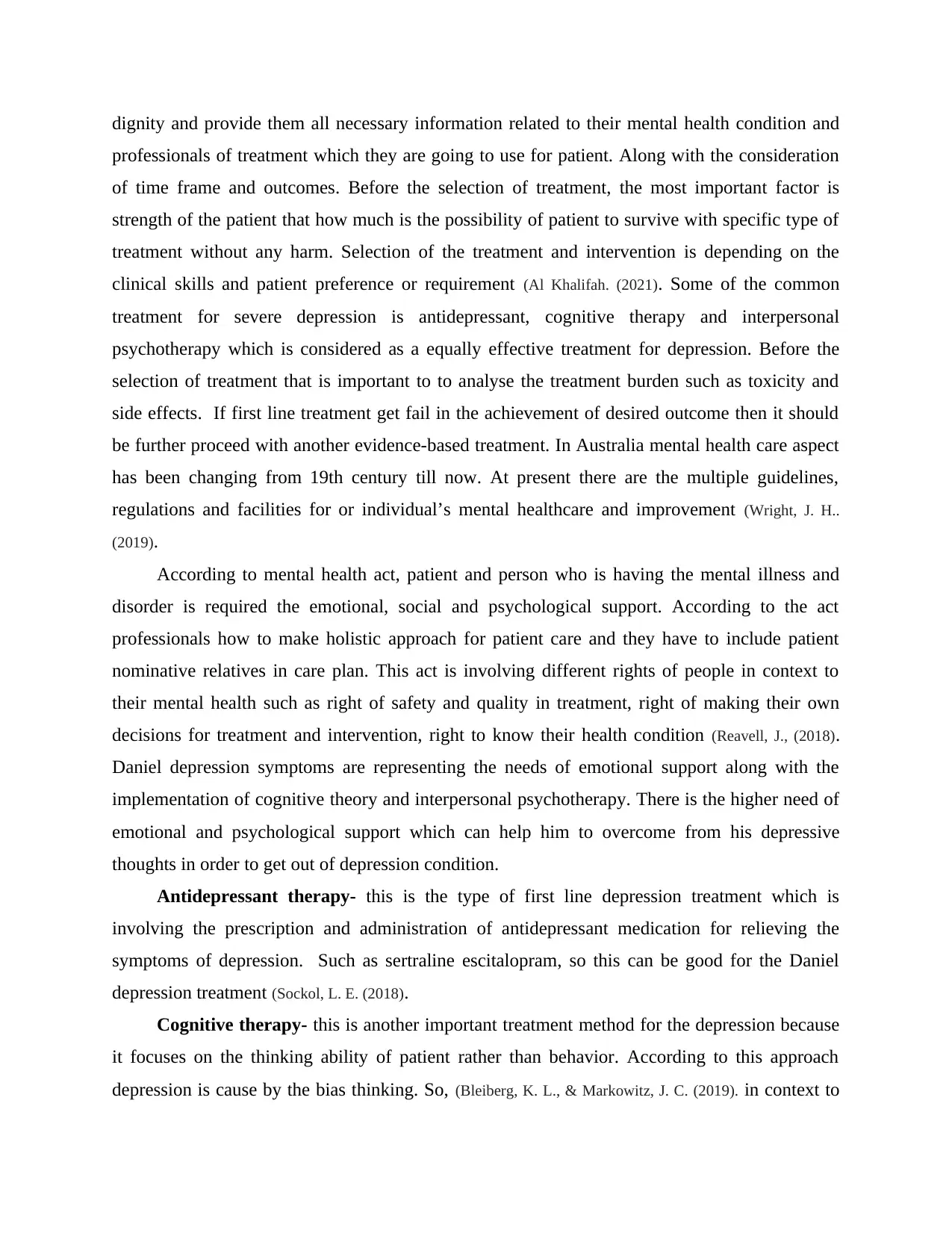
dignity and provide them all necessary information related to their mental health condition and
professionals of treatment which they are going to use for patient. Along with the consideration
of time frame and outcomes. Before the selection of treatment, the most important factor is
strength of the patient that how much is the possibility of patient to survive with specific type of
treatment without any harm. Selection of the treatment and intervention is depending on the
clinical skills and patient preference or requirement (Al Khalifah. (2021). Some of the common
treatment for severe depression is antidepressant, cognitive therapy and interpersonal
psychotherapy which is considered as a equally effective treatment for depression. Before the
selection of treatment that is important to to analyse the treatment burden such as toxicity and
side effects. If first line treatment get fail in the achievement of desired outcome then it should
be further proceed with another evidence-based treatment. In Australia mental health care aspect
has been changing from 19th century till now. At present there are the multiple guidelines,
regulations and facilities for or individual’s mental healthcare and improvement (Wright, J. H..
(2019).
According to mental health act, patient and person who is having the mental illness and
disorder is required the emotional, social and psychological support. According to the act
professionals how to make holistic approach for patient care and they have to include patient
nominative relatives in care plan. This act is involving different rights of people in context to
their mental health such as right of safety and quality in treatment, right of making their own
decisions for treatment and intervention, right to know their health condition (Reavell, J., (2018).
Daniel depression symptoms are representing the needs of emotional support along with the
implementation of cognitive theory and interpersonal psychotherapy. There is the higher need of
emotional and psychological support which can help him to overcome from his depressive
thoughts in order to get out of depression condition.
Antidepressant therapy- this is the type of first line depression treatment which is
involving the prescription and administration of antidepressant medication for relieving the
symptoms of depression. Such as sertraline escitalopram, so this can be good for the Daniel
depression treatment (Sockol, L. E. (2018).
Cognitive therapy- this is another important treatment method for the depression because
it focuses on the thinking ability of patient rather than behavior. According to this approach
depression is cause by the bias thinking. So, (Bleiberg, K. L., & Markowitz, J. C. (2019). in context to
professionals of treatment which they are going to use for patient. Along with the consideration
of time frame and outcomes. Before the selection of treatment, the most important factor is
strength of the patient that how much is the possibility of patient to survive with specific type of
treatment without any harm. Selection of the treatment and intervention is depending on the
clinical skills and patient preference or requirement (Al Khalifah. (2021). Some of the common
treatment for severe depression is antidepressant, cognitive therapy and interpersonal
psychotherapy which is considered as a equally effective treatment for depression. Before the
selection of treatment that is important to to analyse the treatment burden such as toxicity and
side effects. If first line treatment get fail in the achievement of desired outcome then it should
be further proceed with another evidence-based treatment. In Australia mental health care aspect
has been changing from 19th century till now. At present there are the multiple guidelines,
regulations and facilities for or individual’s mental healthcare and improvement (Wright, J. H..
(2019).
According to mental health act, patient and person who is having the mental illness and
disorder is required the emotional, social and psychological support. According to the act
professionals how to make holistic approach for patient care and they have to include patient
nominative relatives in care plan. This act is involving different rights of people in context to
their mental health such as right of safety and quality in treatment, right of making their own
decisions for treatment and intervention, right to know their health condition (Reavell, J., (2018).
Daniel depression symptoms are representing the needs of emotional support along with the
implementation of cognitive theory and interpersonal psychotherapy. There is the higher need of
emotional and psychological support which can help him to overcome from his depressive
thoughts in order to get out of depression condition.
Antidepressant therapy- this is the type of first line depression treatment which is
involving the prescription and administration of antidepressant medication for relieving the
symptoms of depression. Such as sertraline escitalopram, so this can be good for the Daniel
depression treatment (Sockol, L. E. (2018).
Cognitive therapy- this is another important treatment method for the depression because
it focuses on the thinking ability of patient rather than behavior. According to this approach
depression is cause by the bias thinking. So, (Bleiberg, K. L., & Markowitz, J. C. (2019). in context to
Paraphrase This Document
Need a fresh take? Get an instant paraphrase of this document with our AI Paraphraser
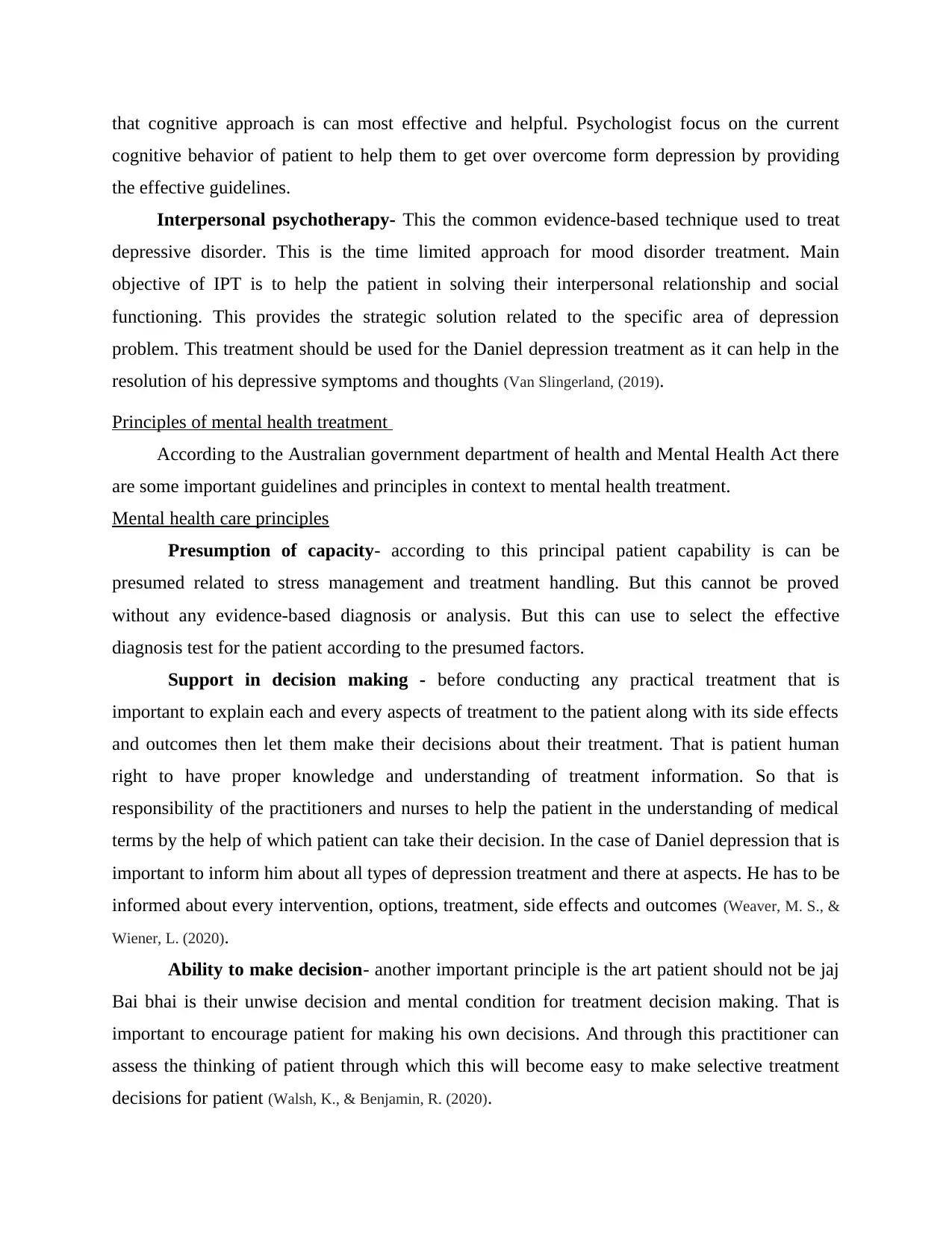
that cognitive approach is can most effective and helpful. Psychologist focus on the current
cognitive behavior of patient to help them to get over overcome form depression by providing
the effective guidelines.
Interpersonal psychotherapy- This the common evidence-based technique used to treat
depressive disorder. This is the time limited approach for mood disorder treatment. Main
objective of IPT is to help the patient in solving their interpersonal relationship and social
functioning. This provides the strategic solution related to the specific area of depression
problem. This treatment should be used for the Daniel depression treatment as it can help in the
resolution of his depressive symptoms and thoughts (Van Slingerland, (2019).
Principles of mental health treatment
According to the Australian government department of health and Mental Health Act there
are some important guidelines and principles in context to mental health treatment.
Mental health care principles
Presumption of capacity- according to this principal patient capability is can be
presumed related to stress management and treatment handling. But this cannot be proved
without any evidence-based diagnosis or analysis. But this can use to select the effective
diagnosis test for the patient according to the presumed factors.
Support in decision making - before conducting any practical treatment that is
important to explain each and every aspects of treatment to the patient along with its side effects
and outcomes then let them make their decisions about their treatment. That is patient human
right to have proper knowledge and understanding of treatment information. So that is
responsibility of the practitioners and nurses to help the patient in the understanding of medical
terms by the help of which patient can take their decision. In the case of Daniel depression that is
important to inform him about all types of depression treatment and there at aspects. He has to be
informed about every intervention, options, treatment, side effects and outcomes (Weaver, M. S., &
Wiener, L. (2020).
Ability to make decision- another important principle is the art patient should not be jaj
Bai bhai is their unwise decision and mental condition for treatment decision making. That is
important to encourage patient for making his own decisions. And through this practitioner can
assess the thinking of patient through which this will become easy to make selective treatment
decisions for patient (Walsh, K., & Benjamin, R. (2020).
cognitive behavior of patient to help them to get over overcome form depression by providing
the effective guidelines.
Interpersonal psychotherapy- This the common evidence-based technique used to treat
depressive disorder. This is the time limited approach for mood disorder treatment. Main
objective of IPT is to help the patient in solving their interpersonal relationship and social
functioning. This provides the strategic solution related to the specific area of depression
problem. This treatment should be used for the Daniel depression treatment as it can help in the
resolution of his depressive symptoms and thoughts (Van Slingerland, (2019).
Principles of mental health treatment
According to the Australian government department of health and Mental Health Act there
are some important guidelines and principles in context to mental health treatment.
Mental health care principles
Presumption of capacity- according to this principal patient capability is can be
presumed related to stress management and treatment handling. But this cannot be proved
without any evidence-based diagnosis or analysis. But this can use to select the effective
diagnosis test for the patient according to the presumed factors.
Support in decision making - before conducting any practical treatment that is
important to explain each and every aspects of treatment to the patient along with its side effects
and outcomes then let them make their decisions about their treatment. That is patient human
right to have proper knowledge and understanding of treatment information. So that is
responsibility of the practitioners and nurses to help the patient in the understanding of medical
terms by the help of which patient can take their decision. In the case of Daniel depression that is
important to inform him about all types of depression treatment and there at aspects. He has to be
informed about every intervention, options, treatment, side effects and outcomes (Weaver, M. S., &
Wiener, L. (2020).
Ability to make decision- another important principle is the art patient should not be jaj
Bai bhai is their unwise decision and mental condition for treatment decision making. That is
important to encourage patient for making his own decisions. And through this practitioner can
assess the thinking of patient through which this will become easy to make selective treatment
decisions for patient (Walsh, K., & Benjamin, R. (2020).
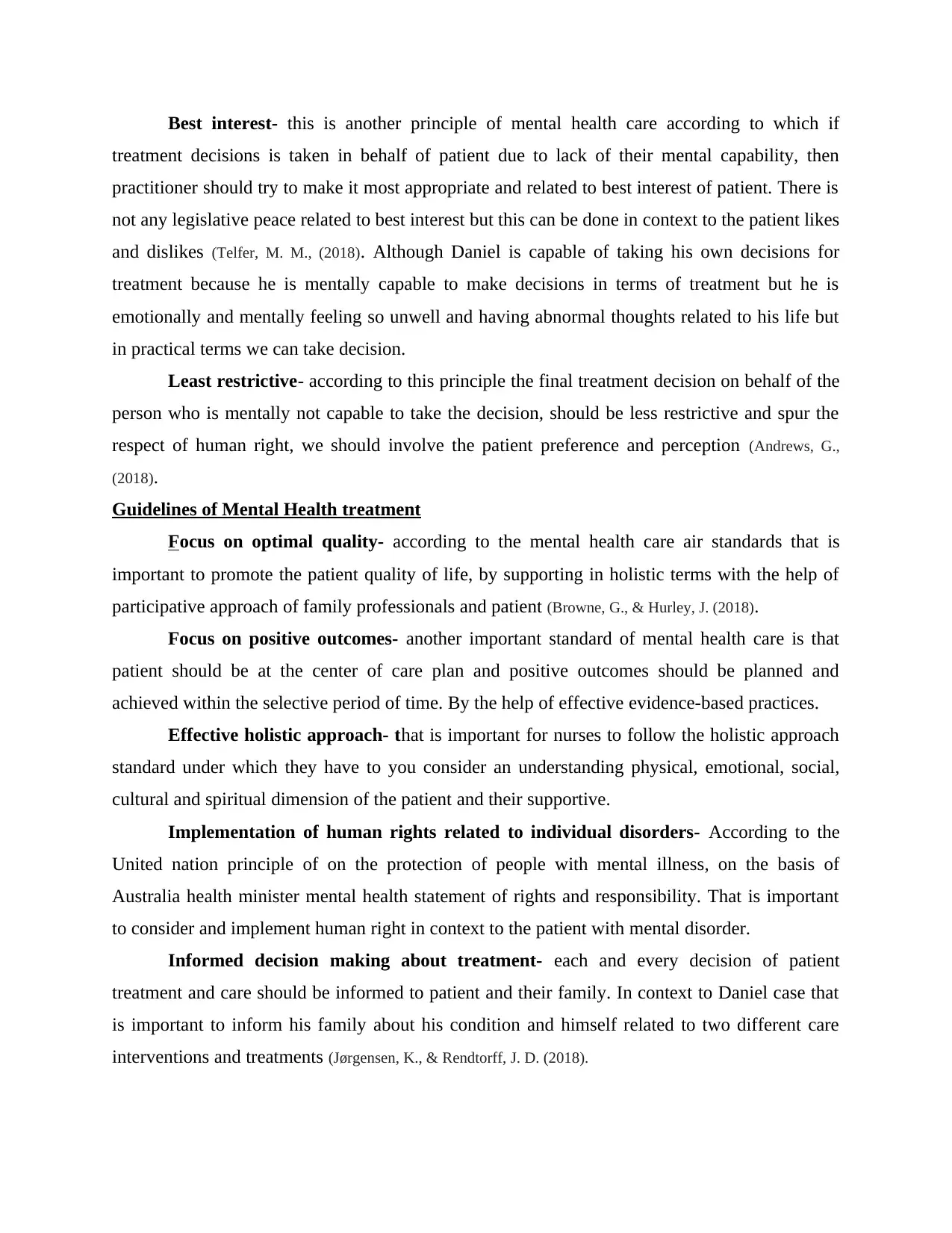
Best interest- this is another principle of mental health care according to which if
treatment decisions is taken in behalf of patient due to lack of their mental capability, then
practitioner should try to make it most appropriate and related to best interest of patient. There is
not any legislative peace related to best interest but this can be done in context to the patient likes
and dislikes (Telfer, M. M., (2018). Although Daniel is capable of taking his own decisions for
treatment because he is mentally capable to make decisions in terms of treatment but he is
emotionally and mentally feeling so unwell and having abnormal thoughts related to his life but
in practical terms we can take decision.
Least restrictive- according to this principle the final treatment decision on behalf of the
person who is mentally not capable to take the decision, should be less restrictive and spur the
respect of human right, we should involve the patient preference and perception (Andrews, G.,
(2018).
Guidelines of Mental Health treatment
Focus on optimal quality- according to the mental health care air standards that is
important to promote the patient quality of life, by supporting in holistic terms with the help of
participative approach of family professionals and patient (Browne, G., & Hurley, J. (2018).
Focus on positive outcomes- another important standard of mental health care is that
patient should be at the center of care plan and positive outcomes should be planned and
achieved within the selective period of time. By the help of effective evidence-based practices.
Effective holistic approach- that is important for nurses to follow the holistic approach
standard under which they have to you consider an understanding physical, emotional, social,
cultural and spiritual dimension of the patient and their supportive.
Implementation of human rights related to individual disorders- According to the
United nation principle of on the protection of people with mental illness, on the basis of
Australia health minister mental health statement of rights and responsibility. That is important
to consider and implement human right in context to the patient with mental disorder.
Informed decision making about treatment- each and every decision of patient
treatment and care should be informed to patient and their family. In context to Daniel case that
is important to inform his family about his condition and himself related to two different care
interventions and treatments (Jørgensen, K., & Rendtorff, J. D. (2018).
treatment decisions is taken in behalf of patient due to lack of their mental capability, then
practitioner should try to make it most appropriate and related to best interest of patient. There is
not any legislative peace related to best interest but this can be done in context to the patient likes
and dislikes (Telfer, M. M., (2018). Although Daniel is capable of taking his own decisions for
treatment because he is mentally capable to make decisions in terms of treatment but he is
emotionally and mentally feeling so unwell and having abnormal thoughts related to his life but
in practical terms we can take decision.
Least restrictive- according to this principle the final treatment decision on behalf of the
person who is mentally not capable to take the decision, should be less restrictive and spur the
respect of human right, we should involve the patient preference and perception (Andrews, G.,
(2018).
Guidelines of Mental Health treatment
Focus on optimal quality- according to the mental health care air standards that is
important to promote the patient quality of life, by supporting in holistic terms with the help of
participative approach of family professionals and patient (Browne, G., & Hurley, J. (2018).
Focus on positive outcomes- another important standard of mental health care is that
patient should be at the center of care plan and positive outcomes should be planned and
achieved within the selective period of time. By the help of effective evidence-based practices.
Effective holistic approach- that is important for nurses to follow the holistic approach
standard under which they have to you consider an understanding physical, emotional, social,
cultural and spiritual dimension of the patient and their supportive.
Implementation of human rights related to individual disorders- According to the
United nation principle of on the protection of people with mental illness, on the basis of
Australia health minister mental health statement of rights and responsibility. That is important
to consider and implement human right in context to the patient with mental disorder.
Informed decision making about treatment- each and every decision of patient
treatment and care should be informed to patient and their family. In context to Daniel case that
is important to inform his family about his condition and himself related to two different care
interventions and treatments (Jørgensen, K., & Rendtorff, J. D. (2018).
⊘ This is a preview!⊘
Do you want full access?
Subscribe today to unlock all pages.

Trusted by 1+ million students worldwide
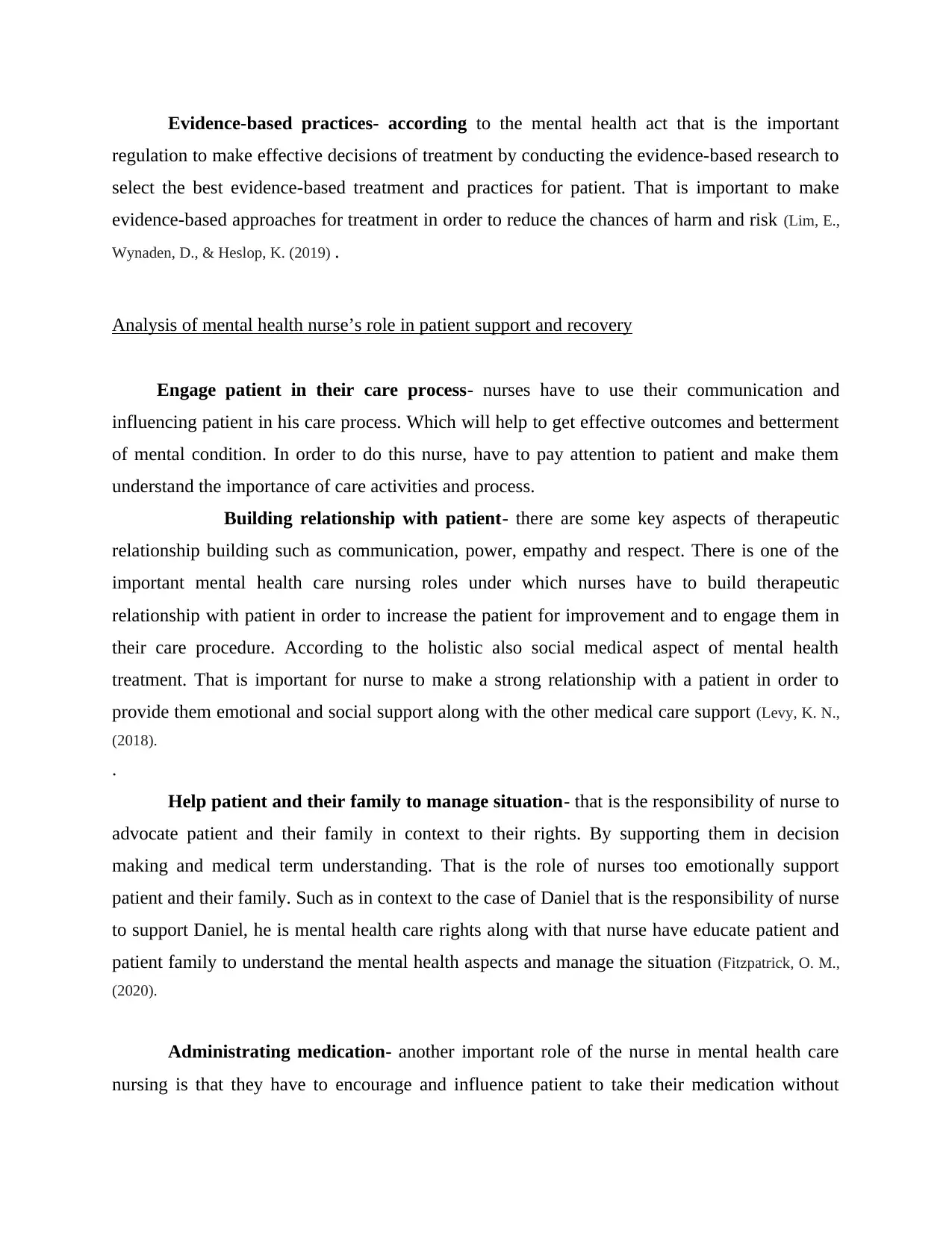
Evidence-based practices- according to the mental health act that is the important
regulation to make effective decisions of treatment by conducting the evidence-based research to
select the best evidence-based treatment and practices for patient. That is important to make
evidence-based approaches for treatment in order to reduce the chances of harm and risk (Lim, E.,
Wynaden, D., & Heslop, K. (2019) .
Analysis of mental health nurse’s role in patient support and recovery
Engage patient in their care process- nurses have to use their communication and
influencing patient in his care process. Which will help to get effective outcomes and betterment
of mental condition. In order to do this nurse, have to pay attention to patient and make them
understand the importance of care activities and process.
Building relationship with patient- there are some key aspects of therapeutic
relationship building such as communication, power, empathy and respect. There is one of the
important mental health care nursing roles under which nurses have to build therapeutic
relationship with patient in order to increase the patient for improvement and to engage them in
their care procedure. According to the holistic also social medical aspect of mental health
treatment. That is important for nurse to make a strong relationship with a patient in order to
provide them emotional and social support along with the other medical care support (Levy, K. N.,
(2018).
.
Help patient and their family to manage situation- that is the responsibility of nurse to
advocate patient and their family in context to their rights. By supporting them in decision
making and medical term understanding. That is the role of nurses too emotionally support
patient and their family. Such as in context to the case of Daniel that is the responsibility of nurse
to support Daniel, he is mental health care rights along with that nurse have educate patient and
patient family to understand the mental health aspects and manage the situation (Fitzpatrick, O. M.,
(2020).
Administrating medication- another important role of the nurse in mental health care
nursing is that they have to encourage and influence patient to take their medication without
regulation to make effective decisions of treatment by conducting the evidence-based research to
select the best evidence-based treatment and practices for patient. That is important to make
evidence-based approaches for treatment in order to reduce the chances of harm and risk (Lim, E.,
Wynaden, D., & Heslop, K. (2019) .
Analysis of mental health nurse’s role in patient support and recovery
Engage patient in their care process- nurses have to use their communication and
influencing patient in his care process. Which will help to get effective outcomes and betterment
of mental condition. In order to do this nurse, have to pay attention to patient and make them
understand the importance of care activities and process.
Building relationship with patient- there are some key aspects of therapeutic
relationship building such as communication, power, empathy and respect. There is one of the
important mental health care nursing roles under which nurses have to build therapeutic
relationship with patient in order to increase the patient for improvement and to engage them in
their care procedure. According to the holistic also social medical aspect of mental health
treatment. That is important for nurse to make a strong relationship with a patient in order to
provide them emotional and social support along with the other medical care support (Levy, K. N.,
(2018).
.
Help patient and their family to manage situation- that is the responsibility of nurse to
advocate patient and their family in context to their rights. By supporting them in decision
making and medical term understanding. That is the role of nurses too emotionally support
patient and their family. Such as in context to the case of Daniel that is the responsibility of nurse
to support Daniel, he is mental health care rights along with that nurse have educate patient and
patient family to understand the mental health aspects and manage the situation (Fitzpatrick, O. M.,
(2020).
Administrating medication- another important role of the nurse in mental health care
nursing is that they have to encourage and influence patient to take their medication without
Paraphrase This Document
Need a fresh take? Get an instant paraphrase of this document with our AI Paraphraser
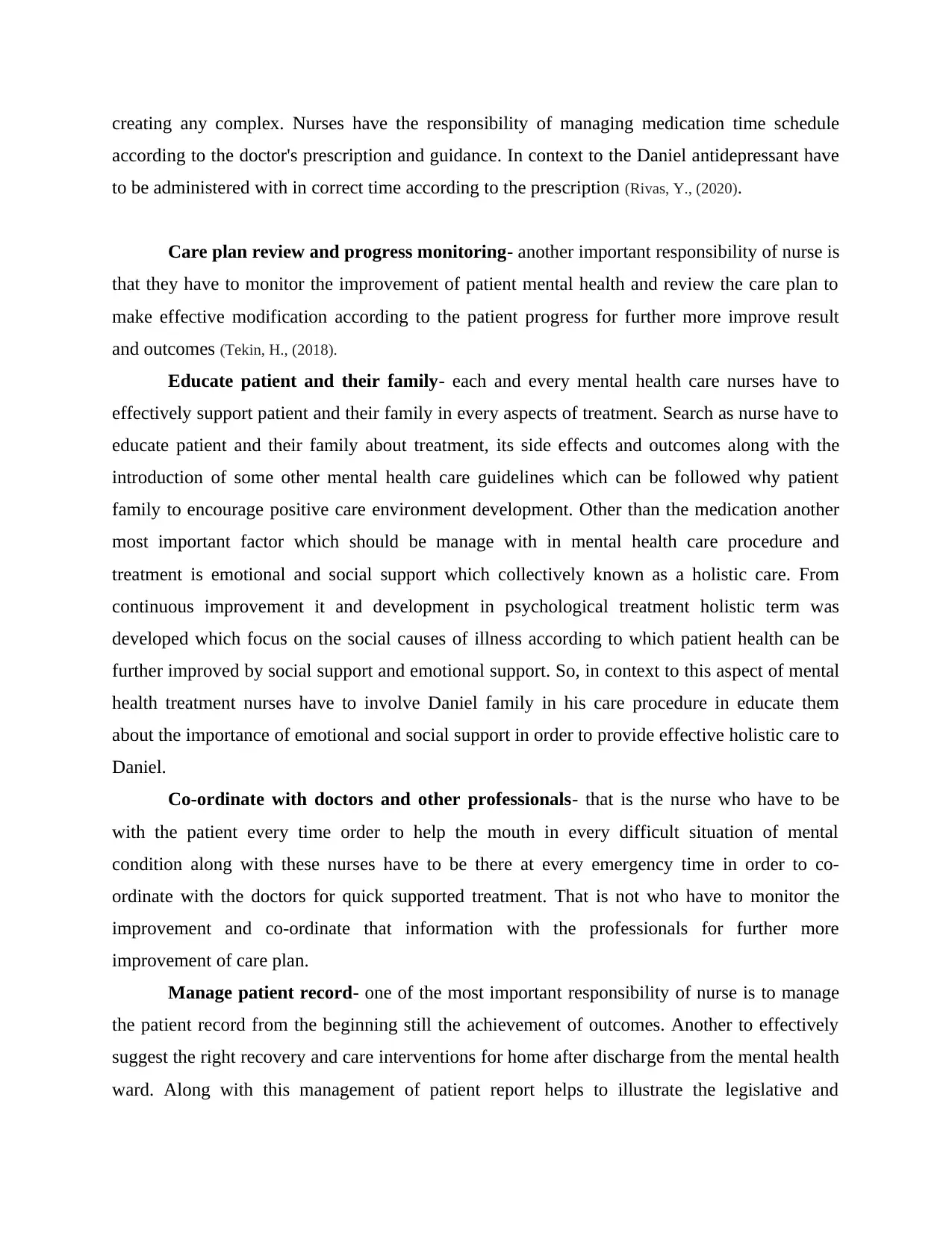
creating any complex. Nurses have the responsibility of managing medication time schedule
according to the doctor's prescription and guidance. In context to the Daniel antidepressant have
to be administered with in correct time according to the prescription (Rivas, Y., (2020).
Care plan review and progress monitoring- another important responsibility of nurse is
that they have to monitor the improvement of patient mental health and review the care plan to
make effective modification according to the patient progress for further more improve result
and outcomes (Tekin, H., (2018).
Educate patient and their family- each and every mental health care nurses have to
effectively support patient and their family in every aspects of treatment. Search as nurse have to
educate patient and their family about treatment, its side effects and outcomes along with the
introduction of some other mental health care guidelines which can be followed why patient
family to encourage positive care environment development. Other than the medication another
most important factor which should be manage with in mental health care procedure and
treatment is emotional and social support which collectively known as a holistic care. From
continuous improvement it and development in psychological treatment holistic term was
developed which focus on the social causes of illness according to which patient health can be
further improved by social support and emotional support. So, in context to this aspect of mental
health treatment nurses have to involve Daniel family in his care procedure in educate them
about the importance of emotional and social support in order to provide effective holistic care to
Daniel.
Co-ordinate with doctors and other professionals- that is the nurse who have to be
with the patient every time order to help the mouth in every difficult situation of mental
condition along with these nurses have to be there at every emergency time in order to co-
ordinate with the doctors for quick supported treatment. That is not who have to monitor the
improvement and co-ordinate that information with the professionals for further more
improvement of care plan.
Manage patient record- one of the most important responsibility of nurse is to manage
the patient record from the beginning still the achievement of outcomes. Another to effectively
suggest the right recovery and care interventions for home after discharge from the mental health
ward. Along with this management of patient report helps to illustrate the legislative and
according to the doctor's prescription and guidance. In context to the Daniel antidepressant have
to be administered with in correct time according to the prescription (Rivas, Y., (2020).
Care plan review and progress monitoring- another important responsibility of nurse is
that they have to monitor the improvement of patient mental health and review the care plan to
make effective modification according to the patient progress for further more improve result
and outcomes (Tekin, H., (2018).
Educate patient and their family- each and every mental health care nurses have to
effectively support patient and their family in every aspects of treatment. Search as nurse have to
educate patient and their family about treatment, its side effects and outcomes along with the
introduction of some other mental health care guidelines which can be followed why patient
family to encourage positive care environment development. Other than the medication another
most important factor which should be manage with in mental health care procedure and
treatment is emotional and social support which collectively known as a holistic care. From
continuous improvement it and development in psychological treatment holistic term was
developed which focus on the social causes of illness according to which patient health can be
further improved by social support and emotional support. So, in context to this aspect of mental
health treatment nurses have to involve Daniel family in his care procedure in educate them
about the importance of emotional and social support in order to provide effective holistic care to
Daniel.
Co-ordinate with doctors and other professionals- that is the nurse who have to be
with the patient every time order to help the mouth in every difficult situation of mental
condition along with these nurses have to be there at every emergency time in order to co-
ordinate with the doctors for quick supported treatment. That is not who have to monitor the
improvement and co-ordinate that information with the professionals for further more
improvement of care plan.
Manage patient record- one of the most important responsibility of nurse is to manage
the patient record from the beginning still the achievement of outcomes. Another to effectively
suggest the right recovery and care interventions for home after discharge from the mental health
ward. Along with this management of patient report helps to illustrate the legislative and
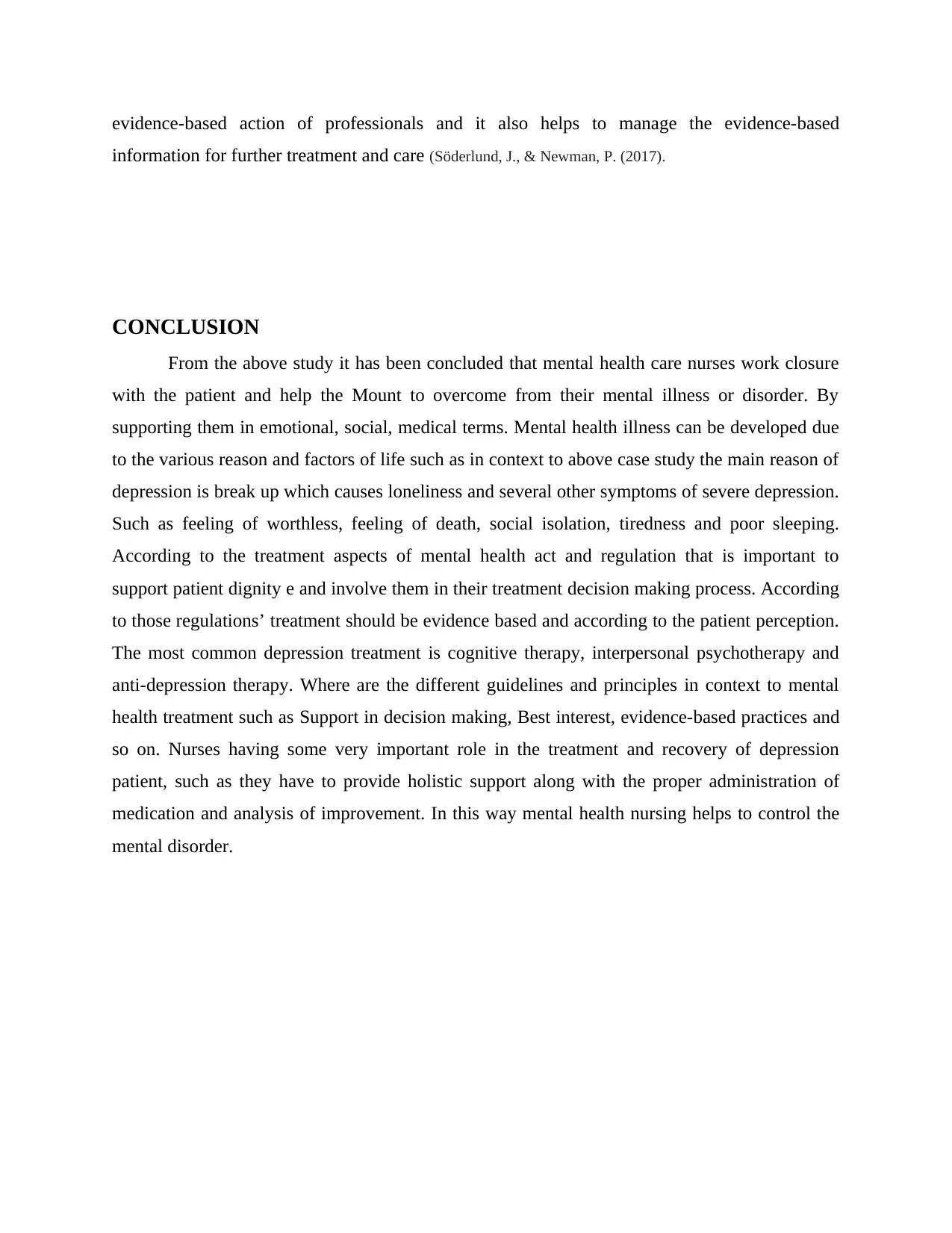
evidence-based action of professionals and it also helps to manage the evidence-based
information for further treatment and care (Söderlund, J., & Newman, P. (2017).
CONCLUSION
From the above study it has been concluded that mental health care nurses work closure
with the patient and help the Mount to overcome from their mental illness or disorder. By
supporting them in emotional, social, medical terms. Mental health illness can be developed due
to the various reason and factors of life such as in context to above case study the main reason of
depression is break up which causes loneliness and several other symptoms of severe depression.
Such as feeling of worthless, feeling of death, social isolation, tiredness and poor sleeping.
According to the treatment aspects of mental health act and regulation that is important to
support patient dignity e and involve them in their treatment decision making process. According
to those regulations’ treatment should be evidence based and according to the patient perception.
The most common depression treatment is cognitive therapy, interpersonal psychotherapy and
anti-depression therapy. Where are the different guidelines and principles in context to mental
health treatment such as Support in decision making, Best interest, evidence-based practices and
so on. Nurses having some very important role in the treatment and recovery of depression
patient, such as they have to provide holistic support along with the proper administration of
medication and analysis of improvement. In this way mental health nursing helps to control the
mental disorder.
information for further treatment and care (Söderlund, J., & Newman, P. (2017).
CONCLUSION
From the above study it has been concluded that mental health care nurses work closure
with the patient and help the Mount to overcome from their mental illness or disorder. By
supporting them in emotional, social, medical terms. Mental health illness can be developed due
to the various reason and factors of life such as in context to above case study the main reason of
depression is break up which causes loneliness and several other symptoms of severe depression.
Such as feeling of worthless, feeling of death, social isolation, tiredness and poor sleeping.
According to the treatment aspects of mental health act and regulation that is important to
support patient dignity e and involve them in their treatment decision making process. According
to those regulations’ treatment should be evidence based and according to the patient perception.
The most common depression treatment is cognitive therapy, interpersonal psychotherapy and
anti-depression therapy. Where are the different guidelines and principles in context to mental
health treatment such as Support in decision making, Best interest, evidence-based practices and
so on. Nurses having some very important role in the treatment and recovery of depression
patient, such as they have to provide holistic support along with the proper administration of
medication and analysis of improvement. In this way mental health nursing helps to control the
mental disorder.
⊘ This is a preview!⊘
Do you want full access?
Subscribe today to unlock all pages.

Trusted by 1+ million students worldwide
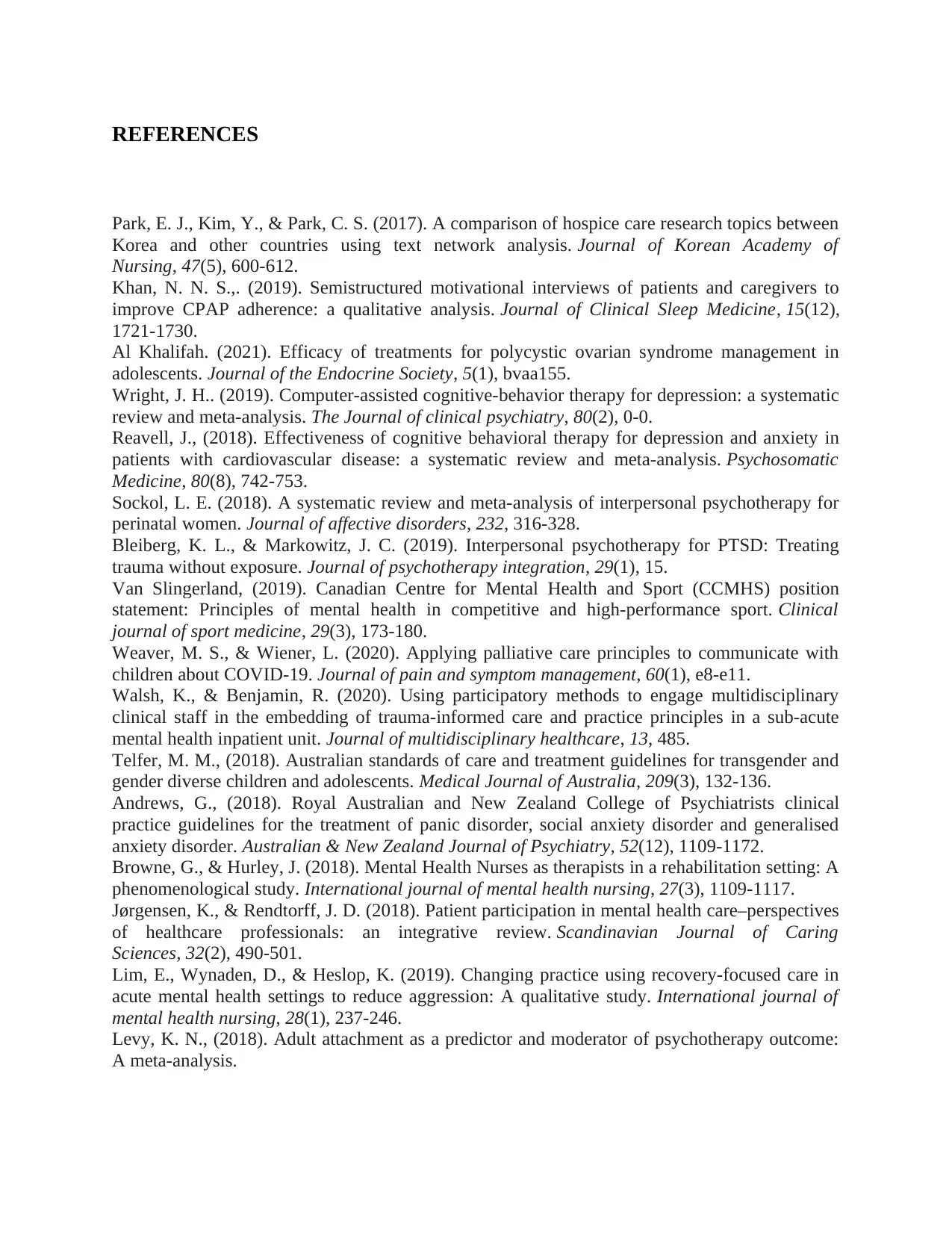
REFERENCES
Park, E. J., Kim, Y., & Park, C. S. (2017). A comparison of hospice care research topics between
Korea and other countries using text network analysis. Journal of Korean Academy of
Nursing, 47(5), 600-612.
Khan, N. N. S.,. (2019). Semistructured motivational interviews of patients and caregivers to
improve CPAP adherence: a qualitative analysis. Journal of Clinical Sleep Medicine, 15(12),
1721-1730.
Al Khalifah. (2021). Efficacy of treatments for polycystic ovarian syndrome management in
adolescents. Journal of the Endocrine Society, 5(1), bvaa155.
Wright, J. H.. (2019). Computer-assisted cognitive-behavior therapy for depression: a systematic
review and meta-analysis. The Journal of clinical psychiatry, 80(2), 0-0.
Reavell, J., (2018). Effectiveness of cognitive behavioral therapy for depression and anxiety in
patients with cardiovascular disease: a systematic review and meta-analysis. Psychosomatic
Medicine, 80(8), 742-753.
Sockol, L. E. (2018). A systematic review and meta-analysis of interpersonal psychotherapy for
perinatal women. Journal of affective disorders, 232, 316-328.
Bleiberg, K. L., & Markowitz, J. C. (2019). Interpersonal psychotherapy for PTSD: Treating
trauma without exposure. Journal of psychotherapy integration, 29(1), 15.
Van Slingerland, (2019). Canadian Centre for Mental Health and Sport (CCMHS) position
statement: Principles of mental health in competitive and high-performance sport. Clinical
journal of sport medicine, 29(3), 173-180.
Weaver, M. S., & Wiener, L. (2020). Applying palliative care principles to communicate with
children about COVID-19. Journal of pain and symptom management, 60(1), e8-e11.
Walsh, K., & Benjamin, R. (2020). Using participatory methods to engage multidisciplinary
clinical staff in the embedding of trauma-informed care and practice principles in a sub-acute
mental health inpatient unit. Journal of multidisciplinary healthcare, 13, 485.
Telfer, M. M., (2018). Australian standards of care and treatment guidelines for transgender and
gender diverse children and adolescents. Medical Journal of Australia, 209(3), 132-136.
Andrews, G., (2018). Royal Australian and New Zealand College of Psychiatrists clinical
practice guidelines for the treatment of panic disorder, social anxiety disorder and generalised
anxiety disorder. Australian & New Zealand Journal of Psychiatry, 52(12), 1109-1172.
Browne, G., & Hurley, J. (2018). Mental Health Nurses as therapists in a rehabilitation setting: A
phenomenological study. International journal of mental health nursing, 27(3), 1109-1117.
Jørgensen, K., & Rendtorff, J. D. (2018). Patient participation in mental health care–perspectives
of healthcare professionals: an integrative review. Scandinavian Journal of Caring
Sciences, 32(2), 490-501.
Lim, E., Wynaden, D., & Heslop, K. (2019). Changing practice using recovery‐focused care in
acute mental health settings to reduce aggression: A qualitative study. International journal of
mental health nursing, 28(1), 237-246.
Levy, K. N., (2018). Adult attachment as a predictor and moderator of psychotherapy outcome:
A meta‐analysis.
Park, E. J., Kim, Y., & Park, C. S. (2017). A comparison of hospice care research topics between
Korea and other countries using text network analysis. Journal of Korean Academy of
Nursing, 47(5), 600-612.
Khan, N. N. S.,. (2019). Semistructured motivational interviews of patients and caregivers to
improve CPAP adherence: a qualitative analysis. Journal of Clinical Sleep Medicine, 15(12),
1721-1730.
Al Khalifah. (2021). Efficacy of treatments for polycystic ovarian syndrome management in
adolescents. Journal of the Endocrine Society, 5(1), bvaa155.
Wright, J. H.. (2019). Computer-assisted cognitive-behavior therapy for depression: a systematic
review and meta-analysis. The Journal of clinical psychiatry, 80(2), 0-0.
Reavell, J., (2018). Effectiveness of cognitive behavioral therapy for depression and anxiety in
patients with cardiovascular disease: a systematic review and meta-analysis. Psychosomatic
Medicine, 80(8), 742-753.
Sockol, L. E. (2018). A systematic review and meta-analysis of interpersonal psychotherapy for
perinatal women. Journal of affective disorders, 232, 316-328.
Bleiberg, K. L., & Markowitz, J. C. (2019). Interpersonal psychotherapy for PTSD: Treating
trauma without exposure. Journal of psychotherapy integration, 29(1), 15.
Van Slingerland, (2019). Canadian Centre for Mental Health and Sport (CCMHS) position
statement: Principles of mental health in competitive and high-performance sport. Clinical
journal of sport medicine, 29(3), 173-180.
Weaver, M. S., & Wiener, L. (2020). Applying palliative care principles to communicate with
children about COVID-19. Journal of pain and symptom management, 60(1), e8-e11.
Walsh, K., & Benjamin, R. (2020). Using participatory methods to engage multidisciplinary
clinical staff in the embedding of trauma-informed care and practice principles in a sub-acute
mental health inpatient unit. Journal of multidisciplinary healthcare, 13, 485.
Telfer, M. M., (2018). Australian standards of care and treatment guidelines for transgender and
gender diverse children and adolescents. Medical Journal of Australia, 209(3), 132-136.
Andrews, G., (2018). Royal Australian and New Zealand College of Psychiatrists clinical
practice guidelines for the treatment of panic disorder, social anxiety disorder and generalised
anxiety disorder. Australian & New Zealand Journal of Psychiatry, 52(12), 1109-1172.
Browne, G., & Hurley, J. (2018). Mental Health Nurses as therapists in a rehabilitation setting: A
phenomenological study. International journal of mental health nursing, 27(3), 1109-1117.
Jørgensen, K., & Rendtorff, J. D. (2018). Patient participation in mental health care–perspectives
of healthcare professionals: an integrative review. Scandinavian Journal of Caring
Sciences, 32(2), 490-501.
Lim, E., Wynaden, D., & Heslop, K. (2019). Changing practice using recovery‐focused care in
acute mental health settings to reduce aggression: A qualitative study. International journal of
mental health nursing, 28(1), 237-246.
Levy, K. N., (2018). Adult attachment as a predictor and moderator of psychotherapy outcome:
A meta‐analysis.
Paraphrase This Document
Need a fresh take? Get an instant paraphrase of this document with our AI Paraphraser
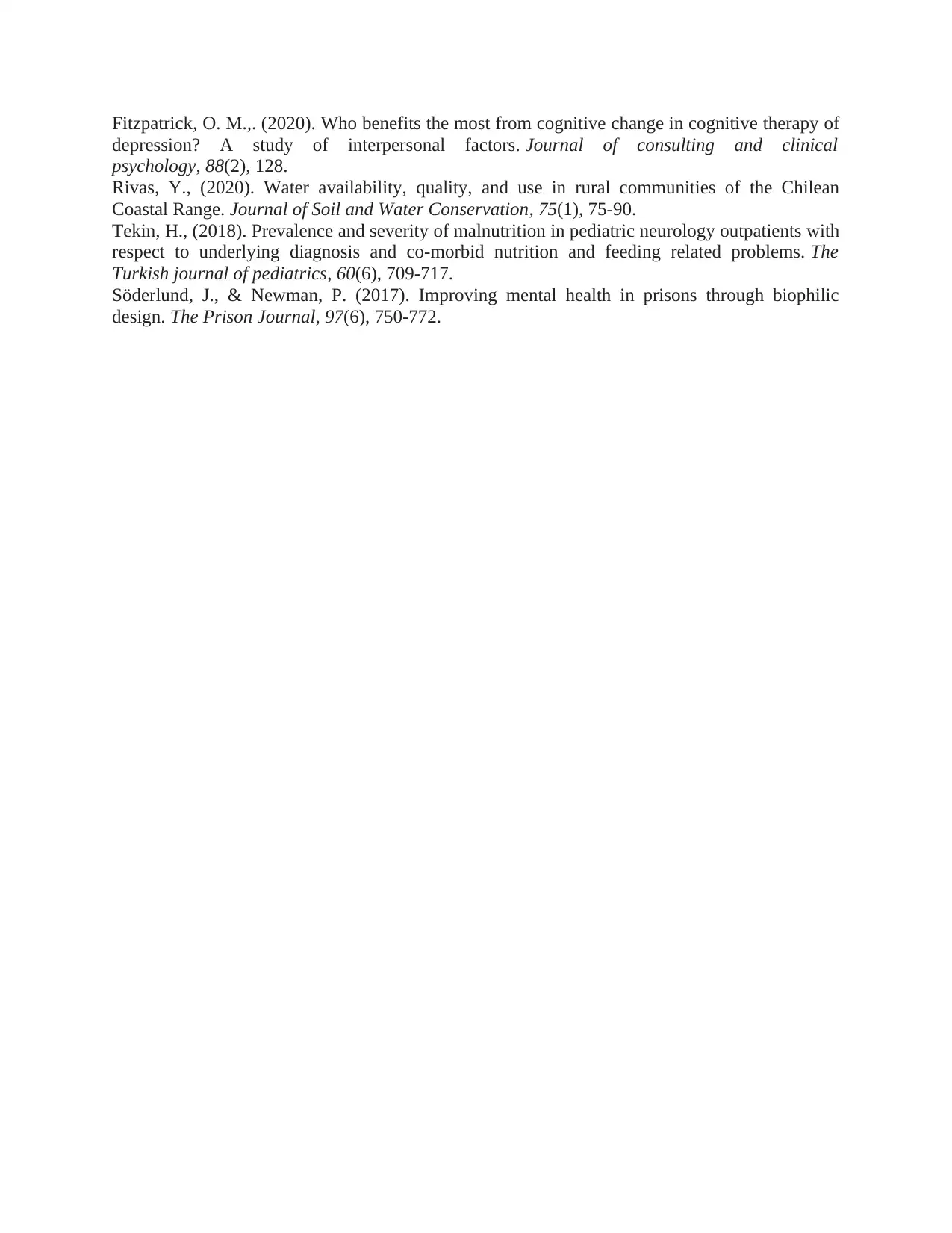
Fitzpatrick, O. M.,. (2020). Who benefits the most from cognitive change in cognitive therapy of
depression? A study of interpersonal factors. Journal of consulting and clinical
psychology, 88(2), 128.
Rivas, Y., (2020). Water availability, quality, and use in rural communities of the Chilean
Coastal Range. Journal of Soil and Water Conservation, 75(1), 75-90.
Tekin, H., (2018). Prevalence and severity of malnutrition in pediatric neurology outpatients with
respect to underlying diagnosis and co-morbid nutrition and feeding related problems. The
Turkish journal of pediatrics, 60(6), 709-717.
Söderlund, J., & Newman, P. (2017). Improving mental health in prisons through biophilic
design. The Prison Journal, 97(6), 750-772.
depression? A study of interpersonal factors. Journal of consulting and clinical
psychology, 88(2), 128.
Rivas, Y., (2020). Water availability, quality, and use in rural communities of the Chilean
Coastal Range. Journal of Soil and Water Conservation, 75(1), 75-90.
Tekin, H., (2018). Prevalence and severity of malnutrition in pediatric neurology outpatients with
respect to underlying diagnosis and co-morbid nutrition and feeding related problems. The
Turkish journal of pediatrics, 60(6), 709-717.
Söderlund, J., & Newman, P. (2017). Improving mental health in prisons through biophilic
design. The Prison Journal, 97(6), 750-772.
1 out of 11
Related Documents
Your All-in-One AI-Powered Toolkit for Academic Success.
+13062052269
info@desklib.com
Available 24*7 on WhatsApp / Email
![[object Object]](/_next/static/media/star-bottom.7253800d.svg)
Unlock your academic potential
Copyright © 2020–2026 A2Z Services. All Rights Reserved. Developed and managed by ZUCOL.





